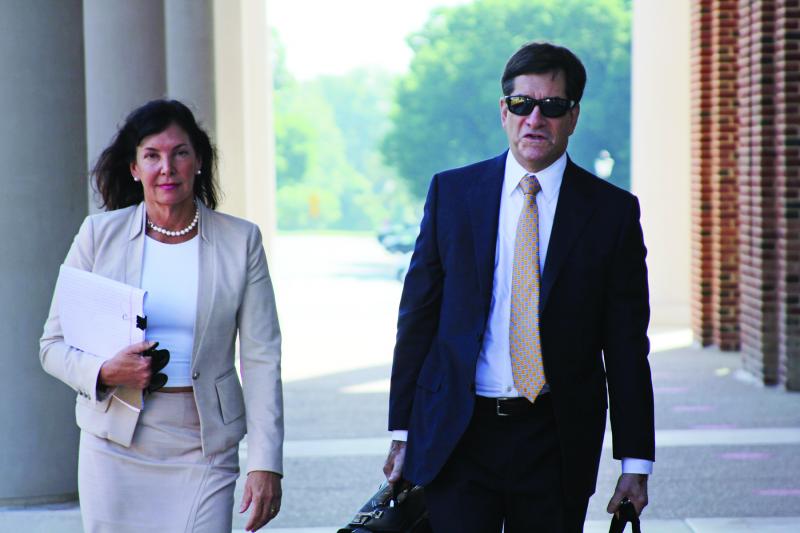Former employees of the state auditor’s office took the stand June 16 in the state’s case against State Auditor Kathy McGuiness, telling the jury about their time in the office.
Elizabeth Mary Vargas, a former employee in 2020, said there were times she didn’t have much work to keep her busy. “Most of the time there was nothing to do,” she said.
Sometimes she watched Netflix, she said.
She said everyone was nice, but she was left out of activities. There was a gift exchange during the holidays, she said, but she was not included in the festivities.
“[It was] not horrible, but it could have been better. Sometimes they played cornhole, but we were never invited to any of that. Everyone seemed nice, but it was weird,” she said.
Rosalee Maurice worked at the auditor’s office from 2019 to 2020 as a casual, seasonal employee earning about $15 per hour. She said her schedule changed after the COVID shutdown. She got an email to return to work in May 2020, she said, but the hours were fewer than before. She resigned in June.
“I went to help my mother in New Jersey,” Maurice said, adding she left on good terms.
Under further questioning, she said, she noticed two young women working in the office; she was told they were interns. The state contends that McGuiness hired her daughter and her daughter’s best friend to work in the office when others were let go because of a lack of work.
McGuiness, a Democrat elected as state auditor in 2018, is now facing trial after a 2021 indictment by a New Castle County Superior Court grand jury on criminal charges of felony theft, intimidation, structuring state contracts in violation of state procurement code, official misconduct, and conflict of interest. A jury trial against McGuiness began June 13 in Kent County Superior Court after state attorneys agreed to move the venue from New Castle County.
Earlier in court, Virginia Bateman, best friend of McGuiness’ daughter Saylar, testified that none of the full-time auditors or employees spoke to them, and she heard comments were made behind their backs.
“They were outwardly rude to Saylar and myself,” she said.
On the stand, Bateman could not recall how she found out about the casual seasonal job she held for the office, and she could not remember if she was interviewed for the job. In a phone recording from June 2021 by state investigator Franklin Robinson, Bateman said she worked for two years in the auditor’s office, and knew McGuiness because she and Saylar grew up together.
After talking to investigator Robinson, Bateman said she texted Saylar about it, and then called McGuiness, but she said she could not recall what was said. “I was intimidated for sure,” Bateman said about Robinson’s interview.
Financial transactions detailed
After three days of testimony, the jury of 12 and five alternates have been given a crash course in state finances. Intricate details of how the state processes purchase orders, invoices and charges made to state-issued purchase cards have been displayed as evidence in several different numerically laden spreadsheets.
The state is trying to prove McGuiness structured a contract with a consulting firm – My Consulting Group – to avoid a public bidding process, and also structured invoice payments below a $5,000 threshold requiring accounting office approval. McGuiness’ attorney Steve Wood has attempted to poke holes in a search warrant issued by the state.
The warrant states that payments to My Campaign Group were split by the auditor’s office into amounts less than $5,000. “That statement is false,” said Wood to Jane Cole, a state witness and director of the Division of Accounting, who replied yes.
Under cross-examination by state prosecutor Mark Denney, Cole said a search warrant was not needed to obtain documents. She said she would describe them as two lines, one a voucher for payment by the state.
She also said there were multiple payments made to My Campaign Group in September 2020. And, she said, some of the actions were improper regarding payments.
In earlier court action, Wood pointed out that an employee in the state accounting office made a mistake on one of the auditor’s transactions, showing complicated rules within the state’s accounting manual are difficult to understand even for professionals. And he showed several purchases made by other state departments that ran into millions of dollars, and which were approved for payment even though mistakes were made.
The trial will continue Tuesday, June 21, in Kent County Superior Court.
Melissa Steele is a staff writer covering the state Legislature, government and police. Her newspaper career spans more than 30 years and includes working for the Delaware State News, Burlington County Times, The News Journal, Dover Post and Milford Beacon before coming to the Cape Gazette in 2012. Her work has received numerous awards, most notably a Pulitzer Prize-adjudicated investigative piece, and a runner-up for the MDDC James S. Keat Freedom of Information Award.






















































